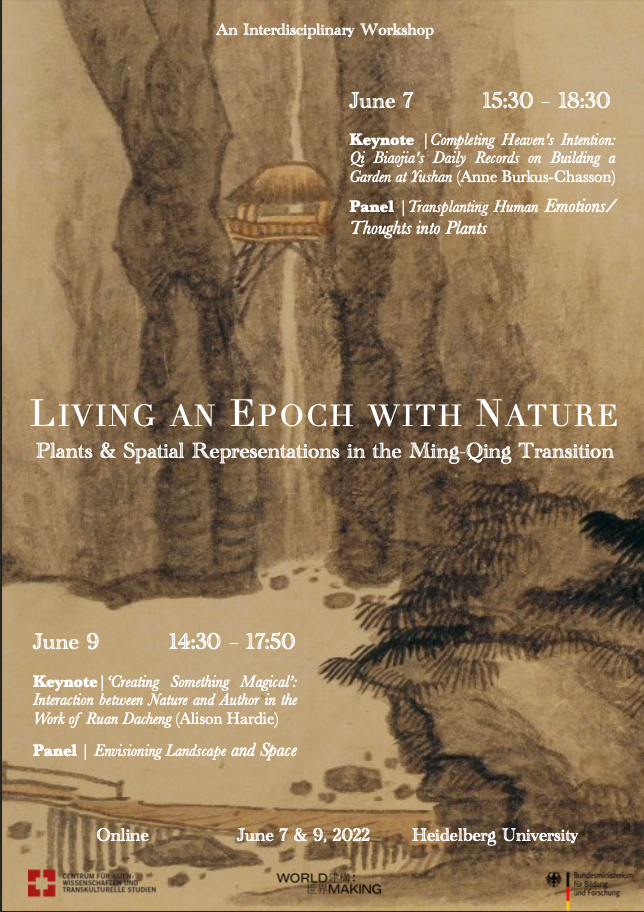Online Workshop "Living an Epoch with Nature: Plants and Spatial Representations in the Ming-Qing Transition" - Day 1
An Interdisciplinary Workshop
Workshop "Living an Epoch with Nature: Plants and Spatial Representations in the Ming-Qing Transition"
Supported by the Heidelberg project “Epochal Lifeworlds: Man, Nature and Technology in Narratives of Crisis and Change" at the Joint Center for Advanced Studies “Worldmaking from a Global Perspective: A Dialogue with China"
Dates:
June 7th 15:30 – 18:30
June 9th 14:30 – 17:50
Organization:
Yizhou Wang and Yingzhi Zhao
Registration:
If you are interested in attending the event, please write to emily.tsui[at]hcts.uni-heidelberg.de. You will receive a link to attend the meeting.
Abstract:
This interdisciplinary workshop focuses on the representations of plants and space and the discourses on human-nature interactions during the Ming-Qing transition of seventeenth-century China. Seventeenth-century China witnessed growing attention to various conflicts, crises, and epochal transformations against the backdrop of political turmoil, dynastic transition, social turbulence, environmental changes, and natural calamities. It is a period especially appropriate to be examined through the lens of space, due to the change of sociopolitical structure that displaced literati from their physical and spiritual homes, and the concomitant shift of aesthetic and cultural values. We adopt space as one of the interpretive frameworks to respond to the characteristics of the period and to facilitate interdisciplinary dialogues. As a cultural construct, nature is the site of psychic projection of humans. The antithesis between nature conceived as a pristine sanctuary and human ingenuity that molds nature to express human concerns is a theme that threads through our work. From the diverse perspectives of art history, literary studies, cultural history, history of knowledge, and philosophy, our speakers discuss how the individual artists, poets, and intellectuals confronted the challenges and interacted with the real or imaginary natural environments through their painting and writing about plants and space in the Ming-Qing transition.
Read the full program, including talk abstracts, here.
Program:
Day 1. June 7, 2022, 15: 30 – 18: 30 (CEST)
| 15: 30 – 15: 40 | Introduction (Yingzhi Zhao and Yizhou Wang) |
| 15: 40 – 16: 40 |
Keynote Lecture 1 Anne Burkus-Chasson (Associate Professor, University of Illinois, Urbana-Champaign): Completing Heaven's Intention: Qi Biaojia's Daily Records on Building a Garden at Yushan |
| 16: 40 – 16: 50 | Break |
| 16: 50 – 18: 00 |
Panel 1. Transplanting Human Emotions/Thoughts into Plants Moderator: Yingzhi Zhao/Yizhou Wang Yizhou Wang (PhD Candidate/Research Fellow, Heidelberg University): The Orchid Knows: A Reassessment of Courtesan-Concubine Gu Mei through Her Paintings and Sisterhood Collecting Nature on Paper? Materia Medica Images in the Seventeenth Century Materia Medica, Wild Herbs, and Fine Vegetables: Conceptualizing Famine Plants in Ming Relief Manuals |
| 18: 00 – 18: 30 | Q&A and Discussion (Discussant: Alison Hardie) |
Day 2. June 9, 2022, 14: 30 – 17: 50 (CEST)
| 14: 30 – 15: 30 |
Keynote Lecture 2 Alison Hardie (Honorary Research Fellow, University of Leeds): 'Creating Something Magical': Interaction between Nature and Author in the Work of Ruan Dacheng |
| 15: 30 – 15: 40 | Break |
| 15: 40 – 16: 50 |
Panel 2. Envisioning Landscape and Space Moderator: Yizhou Wang
Tree Nest, Boat Chamber, and Returning to Simplicity Studio: Dialectics of Artifice and Simplicity Aerial Visions: Heaven, Nature, and Poetic Subjectivity in Wang Fuzhi's Poetry
Bada Shanren: Two World-Shaping Plant-Scapes |
| 16: 50 – 17: 50 | Q&A and Discussion (Discussant: Anne Burkus-Chasson) |
We look forward to seeing all who might be interested!

